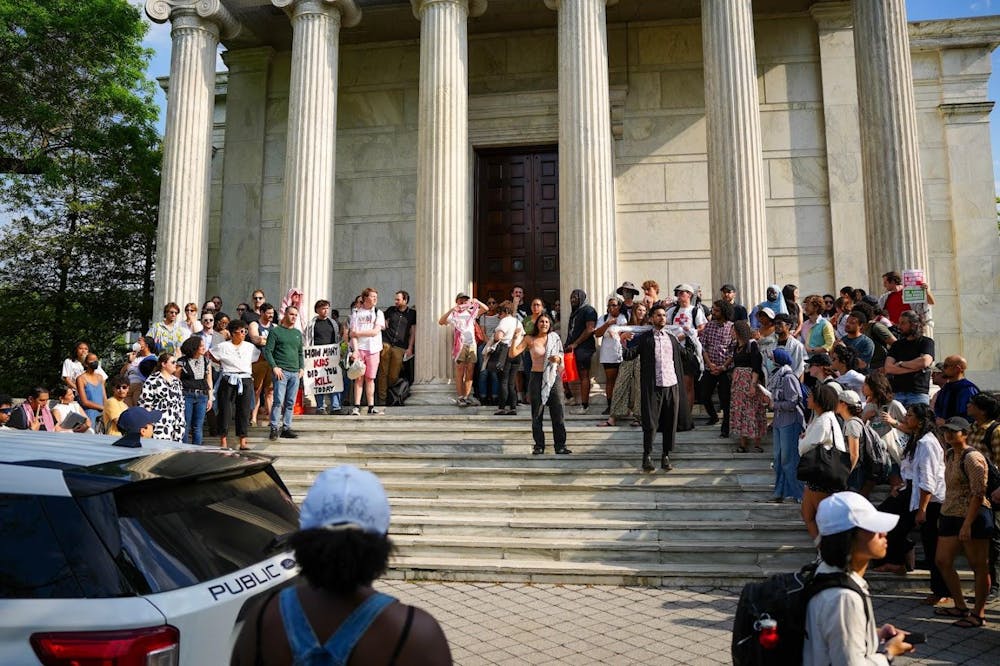The following is a guest contribution and reflects the author’s views alone. For information on how to submit a piece to the Opinion section, click here.
In past sit-ins at Nassau Hall, Firestone, and elsewhere, students have drawn attention to a range of impassioned concerns similar to those raised by students earlier this week in Clio Hall. Calls advocated for: “More Asian American studies!” “Divestiture from South Africa!” “No ROTC!” In these past cases, university administrators bridled at the sit-ins, sometimes assigning students disciplinary consequences for building take-overs.
But unlike the current administration, past presidents like William Bowen and administrators across the years recognized that sit-ins were launched to open a dialogue, and they understood that debating the issues was part of Princeton’s educational mission. Faced with sit-ins, past administrations responded with engagement and discussion. By contrast, the University’s hasty arrests and barring from campus of students engaged in the Clio Hall sit-in marks a shameful break with its own past, and represents a rejection of core principles that have long guided the school’s culture of the vigorous exchange of ideas. Arrests and banishment of students from campus for protesting have never been and should never be accepted tactics.
Reflecting on how a 1995 student sit-in at Nassau Hall transformed the diversity of the curriculum, the Daily Princetonian wrote in 2000 that “four years after students occupied Nassau Hall … the University has fulfilled one of its chief promises to the protesters by hiring … a specialist in Asian American studies.” Then-Dean of the College Nancy Malkiel was conciliatory, explaining that the University was doing its best to address student concerns and pledging to hire additional faculty in the field. But even though “alumni and administrators continue[d] to disagree over whether the protesters managed to influence the University,” no students were arrested for sitting in or barred from campus.
Earlier, in 1978, then-President Bowen confronted his own sit-in over the University’s investments in South Africa. The students were orderly then, as they have been now, and administrators publicly acknowledged and respected their behavior — even while rejecting the idea that demonstrations would affect the University’s decision. University leaders of earlier sit-in eras were not shy about meeting with protesters because, in my view, they understood that an openness to discussion was a core feature of the University’s culture.
Sit-ins came at a cost for students, of course. President Bowen explained in measured language that those engaging in the sit-ins “must be prepared to face penalties,” in University judicial proceedings. Unlike the current administration, however, he did not call in the police for the sit-in; arrests came when 100 students blocked five entrances to Nassau Hall, denying employees access. Opining on civil disobedience, Bowen acknowledged that even while he was critical of the sit-in tactics, “he could imagine circumstances where he felt so strongly about an issue that he could consider it ‘as a legitimate course to take’ himself.”
In discussing appropriate punishment for participants in the sit-in of 1978, the University looked to precedent from past sit-ins; and they were numerous. The Judicial Committee of the University Council sought guidance from the 1969 sit-in at Nassau Hall, the 1970 sit-in at Firestone Library “over minority students’ concerns,” and another 1972 sit-in at Nassau Hall to protest the ROTC program at Princeton. In the end, the 1978 judicial committee handed sitting-in students what a columnist for The Daily Princetonian called a “slap on the wrist” punishment. In the opinion of the columnist, the light penalty seemed like a judgment against the University for its stubborn unwillingness to listen to students.
So what do past precedents teach us about current administrators’ hasty calls for police to arrest students, institution of bans from campus, and support for prosecution? For one, it shows a university willfully ignoring its own past and undermining its values. To be sure, university leaders of the past were critical of students’ employment of sit-ins as a protest tactic, but they were willing to meet, debate, and — occasionally — even listen and change course. Administrators and leaders of earlier eras, unlike our own, were too deeply committed to education, discussion, and open debate — even when they disagreed with students’ beliefs, tactics, and proposals — to quickly call police to campus to arrest student demonstrators.

In light of this history, however incomplete, the actions of Princeton’s current leadership is a shocking departure from a long tradition of thoughtful, measured engagement. Current administrators should follow this historical precedent and renounce policing and criminal sanctions as a response to student sit-ins. It must ask prosecutors to drop charges against the Clio Hall sit-in students.
Moreover, the administration should change course and be willing to open dialogue. As the ‘Prince’ observed in 1978, during the South African divestiture sit-ins and protests, President Bowen could be seen speaking “to a small group on the steps of Corwin Hall early [one] Saturday morning while another, larger group [of protester] kept vigil outside Nassau Hall.” Criminalizing peaceful sit-ins is a sharp departure from Princeton’s past. It strays dangerously from long-standing models of educational leadership and casts a shameful cloud over university culture and values into the future.
Keith Wailoo is the Henry Putnam University Professor of History and Public Affairs. He can be reached at kwailoo@princeton.edu.









